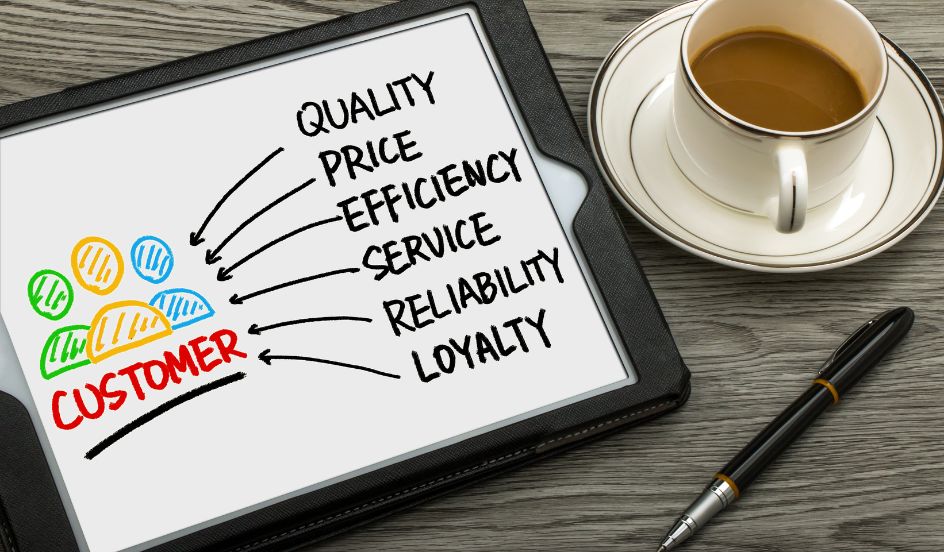Why is Supply Chain Management Important?
September 29th, 2023 / By Rebecca Dykeman
There’s nothing worse than trying to buy an item, only to be told it’s out of stock because of a shipment delay. In our fast-paced society, we’re used to things being readily accessible. Every function that involves buying, selling, making, moving, storing, or delivering a product or service is part of the supply chain. Supply chain management is how these functions are managed and engineered to create happy customers and thriving companies. Let’s explore why supply chain management is important to both businesses and society.
 The importance of supply chains was made apparent by mass shortages during the pandemic.
The importance of supply chains was made apparent by mass shortages during the pandemic.What are the Benefits of Supply Chain Management?
So, we know that supply chain management is important to control the flow of products from point A to point B, but what is needed to have an effective SCM strategy?
- Cost Reduction: Effective SCM helps lower business costs and return higher profits by cutting unnecessary expenses.
- Enhanced Product Quality: SCM ensures quality by reducing product defects, recalls, and maintaining strong relationships with suppliers and manufacturers.
- Streamlined Distribution: With effective SCM systems, a company can guarantee a fast, secure, and cost-effective transportation of products.
- Customer satisfaction: SCM helps ensure customer satisfaction by helping control order accuracy, communication, returns, and prices.
- Global Impact: SCM helps to support disaster relief efforts, by organizing the delivery of essential goods and services.
 A well organized supply chain ensures product quality and customer satisfaction.
A well organized supply chain ensures product quality and customer satisfaction.How have recent global events changed how supply chains work?
The COVID-19 pandemic saw worldwide shortages of essential items and services. A big part of this was due to the disruptions in global supply chains. Government mandated lockdowns caused labour shortages, logistics backups, and demand increases, which all added to the complexities of doing business during the global pandemic. Throughout the pandemic and leading into the present day, geopolitical struggles such as the US-China trade war and the Russia-Ukraine war have made access to raw materials and resources an even bigger struggle for many parts of the world.
The supply chain networks that are responsible for procuring and transporting these necessities of life to consumers have had to adapt greatly to continue to meet people’s needs. As Jeff Turner, the Supply Chain Faculty head at triOS College puts it: “The global markets are continually changing and there will be future events that will cause disruption and uncertainty. Supply chain managers that can quickly adapt their supply chains to meet these challenges will be invaluable to their organizations and the customers that they serve.” Companies are rethinking their supply chain strategies, diversifying their suppliers, and investing in long term solutions to some of the major issues these events have caused. Some of these changes include incorporating different kinds of supply chains into their business models.
“The global markets are continually changing and there will be future events that will cause disruption and uncertainty. Supply chain managers that can quickly adapt their supply chains to meet these challenges will be invaluable to their organizations and the customers that they serve.” – Jeff Turner, Supply Chain Faculty Head at triOS College
- Lean supply chain: A lean supply chain focuses on reducing waste and increasing efficiency. The ultimate goal is to streamline processes by reducing excess inventory and providing customers with the right products at the right time while minimizing costs and delays.
- Agile supply chain: An agile supply chain is designed to quickly adapt based on the demand or supply. It is a flexible supply chain model that can quickly adjust to changes in the market, such as changes in customer demand or disruptions in the supply chain.
- Green supply chain: A green supply chain focuses on reducing the environmental impact of the supply chain. It is a supply chain that is designed to minimize waste, reduce carbon emissions, and promote sustainable practices. This can help businesses reduce their carbon footprint and improve their brand image.
- Resilient supply chain: A resilient supply chain is designed to withstand disruptions, such as natural disasters or pandemics. It is a supply chain that is adaptive enough to quickly recover from disruptions and continue to operate efficiently. A resilient supply chain is able to quickly identify and respond to these disruptions, while still maintaining high levels of quality and customer satisfaction.
 There’s a greater focus on sustainable and green solutions within supply chains.
There’s a greater focus on sustainable and green solutions within supply chains.Why Learn Supply Chain Management?
The SCM industry is still recovering, meaning there is a high demand for professionals with the skills and knowledge to manage new and emerging trends in supply chains. They must be able to manage risk, optimize costs, and ensure quality. Most of these new strategies can help prevent disruptions like we faced during the pandemic. So, what are some reasons to pursue an education in supply chain?
High demand: As stated before, the industry has changed significantly in the last few years. Therefore, companies are in need of professionals with new skills to be able to manage their updated supply chain models.
Diverse career paths: Because supply chains are made up of different functions, someone who’s studied SCM can specialize in specific positions. You might pursue a career in operations, inventory, shipping, business, or sales for example.
Competitive pay: The average salary of a supply chain manager varies depending on what company you work for and your experience level. According to Canada’s Job Bank, the national median wage is $50 hourly. Many SCM jobs also include supplemental bonuses and benefit packages.
 Now more than ever, the SCM industry is invested in resilience, agility, and sustainability to maintain reliable supply chains.
Now more than ever, the SCM industry is invested in resilience, agility, and sustainability to maintain reliable supply chains.Why is Supply Chain Management So Important?
With a world as interconnected as ours, where we’re used to having necessities at our fingertips, managing the complex supply chains that keep businesses afloat and societies thriving is essential. Without supply chain management, it would be impossible to organize the flow of goods and services we rely on to function daily. Supply chain management allows companies to cut excess costs and deliver products to the consumer faster and more efficiently. It ensures that high quality products can reach customers and businesses can maximize their profits without any disruptions. A well-managed supply chain can help a business achieve its objectives and support our every day quality of life.
Find out more about triOS College’s Supply Chain Logistics, Supply Chain and Operations Management, and Supply Chain Online courses and why they’re a great fit for you.
